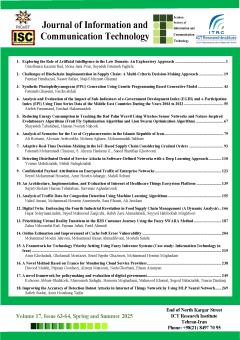Reducing Energy Consumption in Tracking the Red Palm Weevil Using Wireless Sensor Networks and Nature-Inspired Evolutionary Algorithms (Fruit Fly Optimization Algorithm and Lion Swarm Optimization Algorithm)
Subject Areas : هوش مصنوعی و رباتیک
Shayesteh Tabatabaei
1
![]() ,
Hassan Nosrati Nahook
2
,
Hassan Nosrati Nahook
2
![]()
1 - Higher education complex of Saravan
2 - Higher Education Complex of Saravan
Keywords: Clustering, WSN, Rhynchophorus ferrugineus, Target tracking, Fruit Fly algorithm, Lion Optimization algorithm.,
Abstract :
The red palm weevil is one of the most serious pests threatening date palm groves worldwide, causing significant damage and even the destruction of palm trees. Early detection and tracking of this pest are critical to preventing its spread and minimizing the associated damage. Wireless Sensor Networks (WSNs) have emerged as a promising technology for monitoring and identifying this pest in date palm plantations. However, WSNs face various challenges, including limited energy, bandwidth, and computational resources. Therefore, efficient and intelligent methods are required to optimize WSN performance in detecting and tracking this pest. This paper proposes a novel approach that combines two intelligent algorithms—namely, the Fruit Fly Optimization Algorithm (FOA) and the Lion Swarm Optimization (LSO) algorithm—for node clustering in WSNs. The proposed method enhances energy efficiency by reducing the battery consumption of sensor nodes. Simulation results demonstrate that, compared to the LPOBC protocol, the proposed protocol outperforms in terms of energy consumption, end-to-end delay, and throughput. Specifically, end-to-end delay is reduced by 28.286%, throughput is improved by 13.80%, and average battery energy consumption is decreased by 11.86%.
[1] Rhynchophorus ferrugineus - Wikipedia.
[2] W. A. Azmi et al., "The red palm weevil, Rhynchophorus ferrugineus: Current issues and challenges in Malaysia," Oil Palm Bulletin, vol. 74, no. May, pp. 17-24, 2017.
[3] S. Roy, N. Mazumdar, and R. Pamula, "An energy and coverage sensitive approach to hierarchical data collection for mobile sink based wireless sensor networks," Journal of Ambient Intelligence and Humanized Computing, vol. 12, no. 1, pp. 1267-1291, 2021.
[4] F. Delavernhe, A. Rossi, and M. Sevaux, "An online method for robust target tracking using a wireless sensor network," Expert Systems with Applications, vol. 230, p. 120549, 2023.
[5] C. Zhao et al., "An energy-balanced unequal clustering approach for circular wireless sensor networks," Ad Hoc Networks, vol. 132, p. 102872, 2022.
[6] C. Lv, J. Zhu, Z. Tao, and Y. Pi, "An improved target tracking scheme based on MC-MPMC method for mobile wireless sensor networks," EURASIP Journal on Wireless Communications and Networking, vol. 2022, no. 1, p. 74, 2022.
[7] Z. Qu and B. Li, "An energy-efficient clustering method for target tracking based on tracking anchors in wireless sensor networks," Sensors, vol. 22, no. 15, p. 5675, 2022.
[8] E. FayaziBarjini, D. Gharavian, and M. Shahgholian, "Target tracking in wireless sensor networks using NGEKF algorithm," Journal of Ambient Intelligence and Humanized Computing, vol. 11, pp. 3417-3429, 2020.
[9] M. S. Adam, M. H. Anisi, and I. Ali, "Object tracking sensor networks in smart cities: Taxonomy, architecture, applications, research challenges and future directions," Future Generation Computer Systems, vol. 107, pp. 909-923, 2020.
[10] K. A. Darabkh, S. S. Ismail, M. Al-Shurman, I. F. Jafar, E. Alkhader, and M. F. Al-Mistarihi, "Performance evaluation of selective and adaptive heads clustering algorithms over wireless sensor networks," Journal of Network and Computer Applications, vol. 35, no. 6, pp. 2068-2080, 2012.
[11] S. S. Sefati, M. Abdi, and A. Ghaffari, "QoS-based routing protocol and load balancing in wireless sensor networks using the markov model and the artificial bee colony algorithm," Peer-to-Peer Networking and Applications, vol. 16, no. 3, pp. 1499-1512, 2023.
[12] S. Tabatabaei, A. Rajaei, and A. M. Rigi, "A novel energy-aware clustering method via Lion Pride Optimizer Algorithm (LPO) and fuzzy logic in wireless sensor networks (WSNs)," Wireless Personal Communications, vol. 108, pp. 1803-1825, 2019.
[13] حامد شهرکی و شایسته طباطبائی،"بهبود مصرف انرژی در شبکههای حسگر بیسیم با استفاده از الگوریتم مگس میوه و منطق فازی. "، سیستم های فازی و کاربردها, 6 1 (1402): 195-222، doi: 10.22034/jfsa.2023.379555.1157
[14] B. Wang, X. Jin, and B. Cheng, "Lion pride optimizer: An optimization algorithm inspired by lion pride behavior," Science China Information Sciences, vol. 55, pp. 2369-2389, 2012.
